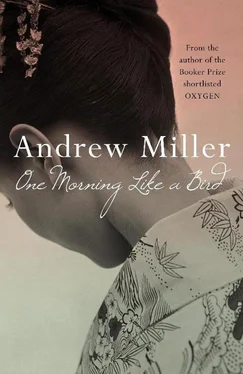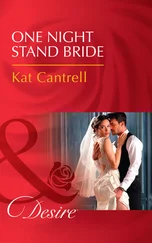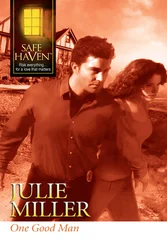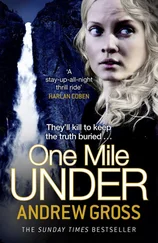‘The child?’
‘Isn’t that what you’re talking about?’
‘Yes.’
‘You are enquiring as a friend, I suppose. Yes. It’s quite proper . . Well, let me assure you she is being well looked after. There is no need for any concern. As for her plans, what she intends to do afterwards . . ’ He wafts the air. ‘She is, as I’m sure you have noticed, a rather independent young woman.’
‘I am glad she is well.’
‘Oh, yes. Physically quite well.’
‘And . . the child’s father?’
‘What about him?’
‘She has told you his name?’
For a moment it looks as if Feneon will refuse to answer his question. Then he moves his head, a sort of bridling. He shrugs again. ‘She has not,’ he says.
‘Nothing?’
‘Why? Are you thinking of challenging him? I doubt he’s the sort of man who fights duels. That would require a certain sense of honour on his part.’
‘But if he didn’t know?’
‘Know?’
‘About the child.’
‘You think that’s likely? Anyway, it’s the not-caring that matters. The not-caring one way or the other. I think we know the type of man who does that. There are names, are there not?’
‘Names,’ whispers Yuji. ‘Yes . .’
‘You better sit down,’ says Feneon, ‘before you fall down. You don’t look well at all. Shall I fetch you some water?’
‘I just wanted to say,’ says Yuji, switching now to the refuge, the audacity, of his own tongue, ‘I just wanted to say that I am the child’s father.’
‘What?’
‘The child’s father.’
‘Who? Who are you talking about?’
‘I . . Alissa . . I am the father.’
There is a long pause, then a bark of laughter. ‘ You ?’
They stare at each other. On Feneon’s face there is a look of utter blankness. Then the blankness is replaced by a mask of astonishment. Not for an instant, not for a single instant, has Feneon imagined anything as impossible as Yuji being what he now claims to be. That much is clear. What is also clear, what has flashed from those grey eyes so plainly, so unguardedly, is the reason for such incredulity. Yuji is Japanese. He is a yellow man. A native. The daughter of a European gentleman might have such a person as a friend — it would almost be a mark of her breeding — but more than that?
‘It was me,’ repeats Yuji, tonelessly. Then, his face in a spasm, he shouts it in French. ‘ C’était moi! C’était moi! Je suis le coupable !’
On the little finger of Feneon’s right hand he wears a ring with a stone in it, a bevelled garnet of some sort, a semi-precious. It is this that opens Yuji’s lip. He falls backwards, is caught by the chair, and sits there, dazed, watching spots of blood fall in dark irregular splashes onto his coat. After a moment he focuses on Feneon’s hand holding out a handkerchief. He takes the handkerchief, presses it to his mouth. In the quiet between them the house moves through its repertory of small sounds, the fizzing of the lamp, the settling of boards.
‘It’s true?’
‘Yes.’
‘Not some idiotic fancy of yours?’
‘Fancy?’
‘One of your stupid ideas. Not true.’
‘It’s true,’ says Yuji. ‘It must be true.’
‘ Must be?’
‘It’s true.’
‘It happened here?’
Yuji nods.
‘Here in the house?’
‘You were away.’
‘So you sneaked in like a thief.’
‘Yes,’ says Yuji. ‘Like a thief.’
‘I used to keep a pistol in this desk,’ says Feneon. ‘You should be very happy that I no longer do.’ He sits, seems momentarily lost, then pulls a clean sheet of paper towards him, unscrews the cap from the pen, writes three lines and tosses the paper onto the floor by Yuji’s feet.
‘Can you read it? It’s where she is. In Yokohama. You will go there tomorrow or you will never see Alissa or myself again. It goes without saying that you would never be permitted to see the child.’
Yuji stands. He does not know if his lip has stopped bleeding. The handkerchief is heavily stained, probably ruined. He folds it, hiding as much of his blood as possible, then reaches out to leave it on the edge of the desk.
‘No, no,’ says Feneon, ‘I don’t want it back.’
The house whose address is scratched in large, angry letters on the piece of paper is a rambling foreign-style building on a quiet avenue high on the Yokohama Bluff. Brown shutters, a first-floor balcony with white wooden railings, a three-storey wooden tower, a small clock above its two upper windows like a mystical eye. On a board beside the porch a sign in English and Kanji reads, ‘The Bullseye Piano Academy. Lessons by appointment only.’ Across the windows of the ground floor, heavy, wine-red curtains have been drawn.
Yuji pulls the bell (a kind of stirrup on a chain), hears a remote jangling in the house’s interior. He waits. No one comes. His heart is beating so hard that he has, after a minute, to turn away to catch his breath. He rings again. Another minute, then the door slowly opens and a face peeps out, young and blonde with dark eyes.
‘You delivering?’ she asks.
‘Delivering?’
‘We’re not open for hours.’
‘I was hoping to visit someone . .’
‘Do we know you?’
‘Miss Feneon?’
‘Who?’
‘Alissa?’
‘Everyone’s in bed.’
‘Ah. I’m sorry.’
She nibbles the edge of a painted fingernail, examines him, this handsome, somewhat battered young man, then steps out of sight and swings open the door. ‘You can wait if you want. Miss Ogilvy will be down soon.’
The room he follows her into is large enough for a public dance. Certainly, shadowed by the curtains, it looks grand enough. She tugs a braided cord at the side of one of the windows, lets in enough of the morning to wake the mirrors and bring a glow to the gilded frames of the paintings — pictures of women beside pools of water, women in gowns on day beds, women combing out their hair. In the centre of the room is a billiard table, two cues laid side by side across one of its corners. There are no pianos.
‘I’m Sandrine,’ says the girl, sitting herself up on the ledge of the table. ‘It’s funny how you’ve both got sticks. You and Alissa.’
Her Japanese, though comprehensible, is thickly accented. She is wearing a robe of pale tangerine and on her feet a pair of yellow slippers that curl extravagantly at the toes.
‘This is Miss Ogilvy’s house?’ asks Yuji.
She tilts her head. ‘You don’t know much, do you.’
‘Are you a pupil here?’
‘A pupil?’
‘At the academy?’
‘What academy?’
‘The piano academy.’
‘Oh.’ She taps the curls of her slippers together, smiles at him. ‘I’m very musical.’
She brings him, unrequested, a glass balloon of brandy. He has seen these glasses before but never drunk from one. For herself she has a smaller glass of something green, then perches again on the billiard table and tells Yuji about a great-uncle of hers who had both legs amputated in a war with the Austrians.
‘That must be difficult for him,’ says Yuji.
She laughs as though he has said something extremely funny, then immediately stops laughing and slides off the table.
‘This is Alissa’s friend,’ she says to the woman silhouetted in the doorway.
The woman looks at Yuji, nods very slightly in response to his bow. ‘Yes,’ she says, ‘I was warned to expect you.’ She turns to Sandrine, addresses her in a language Yuji can only guess at. Russian, perhaps. Turkish, Farsi. The girl hangs her head, answers meekly, then hurries from the room, scuffing the leather soles of her slippers and leaving the little glass of green liquor behind her.
Читать дальше












